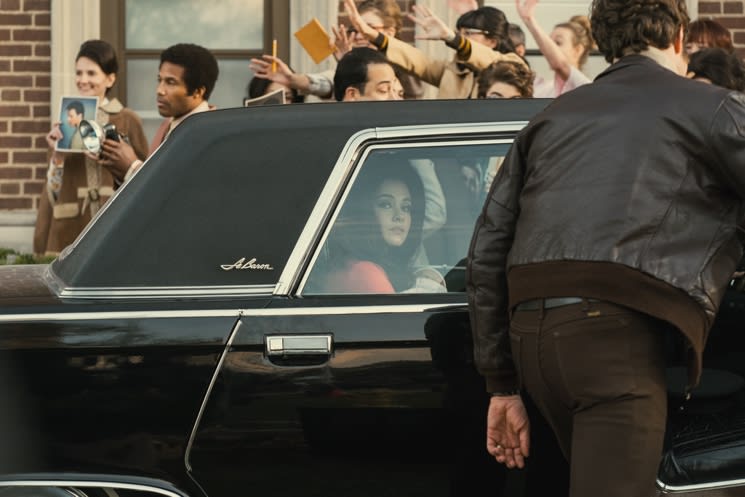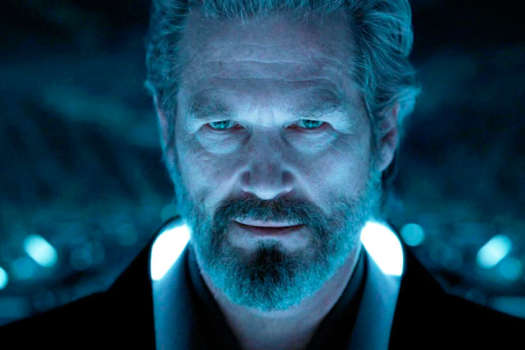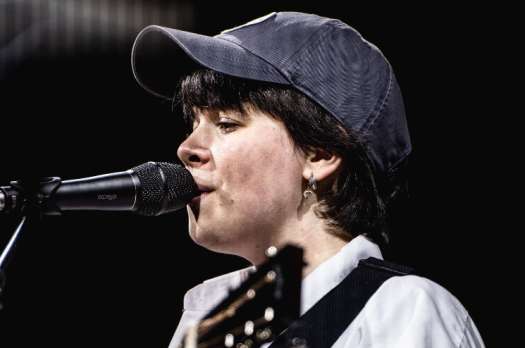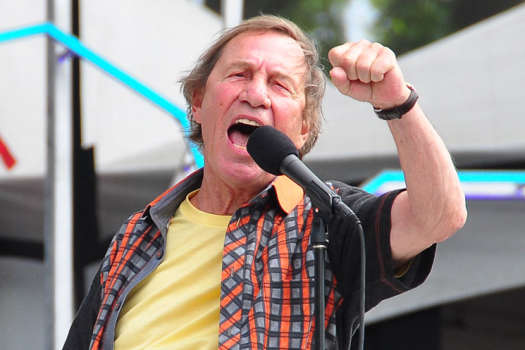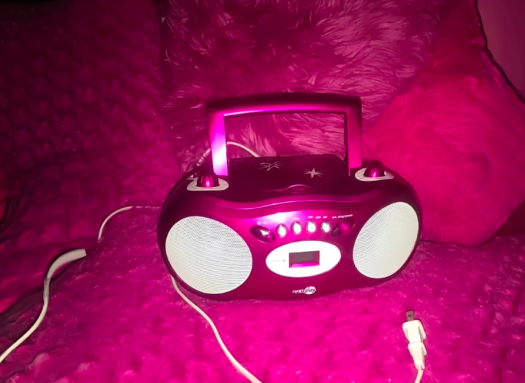For decades, Elvis Presley Enterprises (EPE) — the entity created to manage the famed singer's assets, likeness and legacy following his untimely passing — maintained an air of fairytale-dom around his relationship with ex-wife Priscilla Beaulieu Presley. (And for what it's worth, Priscilla was chairperson and actively involved in EPE's dealings from its inception until her trusteeship was withdrawn this year via their late daughter, Lisa Marie Presley's, will.)
The reality of their coupling, though, was messy and complicated — a side Priscilla shared in her 1985 memoir, Elvis and Me, written with Sandra Harmon, which has now been adapted to the big screen by Sofia Coppola.
Priscilla begins and ends with Elvis. Coppola opts to skip over Priscilla's childhood and begins with the 14-year-old freshman doing her homework in a diner on an army base in West Germany when an officer approaches, asking if she's a fan of Elvis Presley. Like most young people in 1959, the answer is a resounding "yes" — and, while Priscilla's eyes light up when the officer invites her to Elvis's home for a party, she declines knowing her parents will stop her. Much to her surprise, though, her parents grant permission after the officer personally discusses the details of the party with them. This, according to Priscilla Beaulieu, is how their courtship began.
Following their few chaste months together in West Germany, Elvis returns to the US and Priscilla is back to being a normal high school student. Years pass without a word from Elvis until she receives a phone call from him in 1962, asking her to come out to the US. Five years later, wedding bells ring and baby Lisa Marie Presley is introduced to the world soon after. Before long, it's 1972 and Priscilla is driving out of Graceland's gates as the soon-to-be ex-wife of Elvis Presley.
Despite covering over a decade of Priscilla's life in just under two hours, Coppola moves the film at a slow and quiet pace. In contrast (and contradiction) to last year's Baz Luhrmann biopic — made with the cooperation of EPE — which depicted Priscilla as a strong presence and at times an inspiration to Elvis, Priscilla shows her life as mostly subdued and disconnected from the raucousness of Elvis's lifestyle — seemingly a woman who existed on the outskirts of Elvis's life rather than as a part of it. (Unsurprisingly, Priscilla was made without EPE's involvement.)
Where Luhrmann illustrated an explosion of fame and fortune, Coppola considers the stillness of living in the aftershock. Within this world, Cailee Spaeny turns in a restrained performance as Priscilla, moving quietly without much vibrancy. Although this may sound like a negative point of criticism, anyone who has read Elvis and Me will see Spaeny's portrayal of Priscilla as precisely accurate.
Similarly, and perhaps controversially, Jacob Elordi's Elvis is also free of the magnetism and charisma that defined the rock 'n' roll legend — once again though, this is presumably by design.
Just as Coppola's delivery of Priscilla's life differs from Luhrmann's biopic, her film shows another side of Elvis. Gone are the qualities that made millions around the world fall in love with him. Elordi's Elvis, when not throwing a chair Priscilla's way, is muted and almost bland — perhaps reflecting how Priscilla saw him when the gold dust settled.
The Elvis of Priscilla is the one that the public never saw in his lifetime: a man with an all-consuming fascination with the spiritual world, outwardly troubled and frustrated by his career, and, more to the point, a man with a volatile temper and controlling nature.
A fellow Elvis fan asked me whether Coppola left any room for discussion about their relationship — was there any space given to Elvis's side? Emphatically, the answer is no.
Coppola remains mostly faithful to the source material. As such, the film also doesn't make any effort to understand the man behind the icon. (It is Priscilla's movie, after all.) We see Elvis instructing Priscilla on what to wear ("Keep away from those large prints — you're small"), enraged when she hits him too hard with a pillow ("You're not a goddamn man"), and carelessly handing her pills to help her sleep without much explanation. He's simply an angry and domineering rock star with a drug habit.
Coppola does leave out some aspects of Priscilla's story — some that make Priscilla appear not so passive (e.g. her own extramarital affairs), some that give Priscilla more personality (e.g. her failed attempt at making lasagna for the gang) and some that could have made Elvis look worse (e.g. Elvis instructing Priscilla to write post-dated postcards to her parents from Memphis before taking her across state lines). Since Elvis and Me's publication, Priscilla has walked back some of the events described in her book, which begs the question of whether or not Priscilla reflects her own reevaluations of her memories from their time together. (Notably, Priscilla serves as an executive producer on the film.)
For as much as many of these stories will shock some, and the degree to which their relationship, namely their age gap, is assessed through a modern day lens, Coppola doesn't hang her hat on those moments or issues. Her focus throughout the film is the bread and butter of her career: a young woman somehow on the sidelines of her own life.
Of all the directors working today, there is no one better suited than Sofia Coppola to make a movie about Priscilla's life with Elvis. Her visual language is a match made for 1960s America, and her penchant for reticent storytelling drives home the loneliness and separation Priscilla describes in her book.
Unintentionally, Priscilla comes at a poetic time in its subject's life. As her eldest granddaughter takes over the family reigns of EPE and Graceland, for the first time in almost 45 years, Priscilla won't have an official say over the comings and goings of Elvis's legacy — a man who, for better and for worse, she still considers to be her "greatest influence" and the love of her life.
(Elevation Pictures)The reality of their coupling, though, was messy and complicated — a side Priscilla shared in her 1985 memoir, Elvis and Me, written with Sandra Harmon, which has now been adapted to the big screen by Sofia Coppola.
Priscilla begins and ends with Elvis. Coppola opts to skip over Priscilla's childhood and begins with the 14-year-old freshman doing her homework in a diner on an army base in West Germany when an officer approaches, asking if she's a fan of Elvis Presley. Like most young people in 1959, the answer is a resounding "yes" — and, while Priscilla's eyes light up when the officer invites her to Elvis's home for a party, she declines knowing her parents will stop her. Much to her surprise, though, her parents grant permission after the officer personally discusses the details of the party with them. This, according to Priscilla Beaulieu, is how their courtship began.
Following their few chaste months together in West Germany, Elvis returns to the US and Priscilla is back to being a normal high school student. Years pass without a word from Elvis until she receives a phone call from him in 1962, asking her to come out to the US. Five years later, wedding bells ring and baby Lisa Marie Presley is introduced to the world soon after. Before long, it's 1972 and Priscilla is driving out of Graceland's gates as the soon-to-be ex-wife of Elvis Presley.
Despite covering over a decade of Priscilla's life in just under two hours, Coppola moves the film at a slow and quiet pace. In contrast (and contradiction) to last year's Baz Luhrmann biopic — made with the cooperation of EPE — which depicted Priscilla as a strong presence and at times an inspiration to Elvis, Priscilla shows her life as mostly subdued and disconnected from the raucousness of Elvis's lifestyle — seemingly a woman who existed on the outskirts of Elvis's life rather than as a part of it. (Unsurprisingly, Priscilla was made without EPE's involvement.)
Where Luhrmann illustrated an explosion of fame and fortune, Coppola considers the stillness of living in the aftershock. Within this world, Cailee Spaeny turns in a restrained performance as Priscilla, moving quietly without much vibrancy. Although this may sound like a negative point of criticism, anyone who has read Elvis and Me will see Spaeny's portrayal of Priscilla as precisely accurate.
Similarly, and perhaps controversially, Jacob Elordi's Elvis is also free of the magnetism and charisma that defined the rock 'n' roll legend — once again though, this is presumably by design.
Just as Coppola's delivery of Priscilla's life differs from Luhrmann's biopic, her film shows another side of Elvis. Gone are the qualities that made millions around the world fall in love with him. Elordi's Elvis, when not throwing a chair Priscilla's way, is muted and almost bland — perhaps reflecting how Priscilla saw him when the gold dust settled.
The Elvis of Priscilla is the one that the public never saw in his lifetime: a man with an all-consuming fascination with the spiritual world, outwardly troubled and frustrated by his career, and, more to the point, a man with a volatile temper and controlling nature.
A fellow Elvis fan asked me whether Coppola left any room for discussion about their relationship — was there any space given to Elvis's side? Emphatically, the answer is no.
Coppola remains mostly faithful to the source material. As such, the film also doesn't make any effort to understand the man behind the icon. (It is Priscilla's movie, after all.) We see Elvis instructing Priscilla on what to wear ("Keep away from those large prints — you're small"), enraged when she hits him too hard with a pillow ("You're not a goddamn man"), and carelessly handing her pills to help her sleep without much explanation. He's simply an angry and domineering rock star with a drug habit.
Coppola does leave out some aspects of Priscilla's story — some that make Priscilla appear not so passive (e.g. her own extramarital affairs), some that give Priscilla more personality (e.g. her failed attempt at making lasagna for the gang) and some that could have made Elvis look worse (e.g. Elvis instructing Priscilla to write post-dated postcards to her parents from Memphis before taking her across state lines). Since Elvis and Me's publication, Priscilla has walked back some of the events described in her book, which begs the question of whether or not Priscilla reflects her own reevaluations of her memories from their time together. (Notably, Priscilla serves as an executive producer on the film.)
For as much as many of these stories will shock some, and the degree to which their relationship, namely their age gap, is assessed through a modern day lens, Coppola doesn't hang her hat on those moments or issues. Her focus throughout the film is the bread and butter of her career: a young woman somehow on the sidelines of her own life.
Of all the directors working today, there is no one better suited than Sofia Coppola to make a movie about Priscilla's life with Elvis. Her visual language is a match made for 1960s America, and her penchant for reticent storytelling drives home the loneliness and separation Priscilla describes in her book.
Unintentionally, Priscilla comes at a poetic time in its subject's life. As her eldest granddaughter takes over the family reigns of EPE and Graceland, for the first time in almost 45 years, Priscilla won't have an official say over the comings and goings of Elvis's legacy — a man who, for better and for worse, she still considers to be her "greatest influence" and the love of her life.
